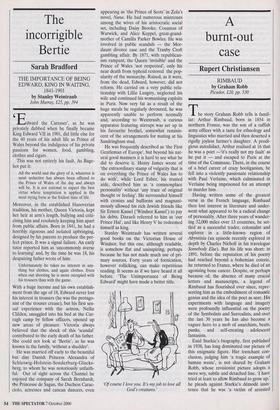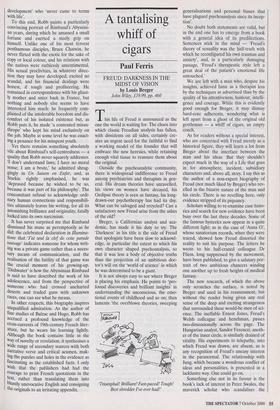A burnt-out case
Rupert Christiansen
RIMBAUD by Graham Robb Picador, £20, pp. 530 The story Graham Robb tells is famil- iar: Arthur Rimbaud, born in 1854 in northern France, was the son of a raffish army officer with a taste for ethnology and linguistics who married and then deserted a rigidly joyless farmer's daughter. A prodi- gious autodidact, Arthur realised at 16 that he was a poet =it's really not my fault' as he put it — and escaped to Paris at the time of the Commune. There, in the course of a brief career of crazy hooliganism, he fell into a violently passionate relationship with Paul Verlaine, which culminated in Verlaine being imprisoned for an attempt to murder him.
Having written some of the greatest verse in the French language, Rimbaud then lost interest in literature and under- went what appeared to be a radical change of personality. After three years of wander- ing 32,000 miles over 13 countries, he set- tled as a successful trader, colonialist and explorer in a little-known region of Abyssinia (an episode recently explored in depth by Charles Nicholl in his travelogue Somebody Else). But his life was short: in 1891, before the reputation of his poetry had reached beyond a bohemian coterie, he returned to France, where he died of an agonising bone cancer. Despite, or perhaps because of, the absence of many crucial letters and manuscripts, a legend of Rimbaud has flourished ever since, repre- senting him as the embodiment of romantic genius and the idea of the poet as seer. His experiments with language and imagery were profoundly influential on the poetry of the Symbolists and Surrealists, and over the last 30 years he has also become a vaguer hero to a mob of anarchists, beats, punks, and self-creating adolescent fantasists.
Enid Starkie's biography, first published in 1938, has long dominated our picture of this enigmatic figure. Her trenchant con- clusion, judging him 'a tragic example of human waste', is not shared by Graham Robb, whose revisionist picture adopts a more wry, subtle and detached line. 'I have tried at least to allow Rimbaud to grow up,' he pleads against Starkie's &mode insis- tence that he was 'a victim of arrested development' who 'never came to terms with life'.
To this end, Robb paints a particularly convincing portrait of Rimbaud's Abyssini- an years, during which he amassed a small fortune and exerted a steely grip on himself. Unlike one of his most fervent posthumous disciples, Bruce Chatwin, he never flirted with the exotic for the sake of copy or local colour, and his relations with the natives were ruthlessly unsentimental. His sexual proclivities, in whatever direc- tion they may have developed, excited no scandal, and his financial dealings were honest, if tough and profiteering. He remained in correspondence with his ghast- ly mother and sister back in France, but nothing and nobody else seems to have interested him much: he frequently com- plained of the intolerable boredom and dis- comfort of his isolated existence but, as Robb puts it, he made `a contented misan- thrope' who kept his mind exclusively on the job. Maybe at some level he was enact- ing a penance for his misspent youth.
Yet there remains something absolutely vile about Rimbaud's self-centredness — a quality that Robb never squarely addresses. `I don't understand laws; I have no moral sense; I am a brute,' he admitted shrug- gingly in Un Saison en Enfer, and, as Starkie rightly emphasised, he was `depraved because he wished to be so, because it was part of his philosophy'. The concomitant refusal to acknowledge ordi- nary human connections and responsibili- ties ultimately leaves his writing, for all its astonishing brilliance and originality, fatally locked into its own narcissism.
It has never surprised me that Rimbaud dismissed his muse as peremptorily as he did: the celebrated declaration in Illumina- tions that `J'ai seul la clef de cette parade sauvage' indicates someone for whom writ- ing was a private game rather than a neces- sary means of communication, and the realisation of the futility of that game was the crucial moment of his growing-up. `Dishwater' is how the Abyssinian Rimbaud is said to have described the work of his adolescence, and from the perspective of someone who had crossed uncharted deserts and traded guns with unknown races, one can see what he means.
In other respects, this biography inspires unqualified admiration. As the author of fine studies of Balzac and Hugo, Robb has accrued a profound knowledge of the cross-currents of 19th-century French liter- ature, but he wears his learning lightly. Although the book contains little in the way of novelty or revelation, it synthesises a wide range of secondary sources with both narrative verve and critical acumen, mak- ing the puzzles and holes in the evidence as fascinating as the established facts. I only wish that the publishers had had the courage to print French quotations in the text, rather than translating them into bluntly unevocative English and consigning the originals to an irritating appendix.



















































































 Previous page
Previous page